Finding attractive, affordable, and long-lasting materials for your rental property can be a daunting task.
The last thing you want is for your floors to be an eyesore or fall apart after a few short years.
As a property owner, you want to make sure that you are getting the best value for your money when it comes to flooring since it can make all the difference in the value and appeal of your rental property.
However, not all flooring options are created equal; some will be better suited for a rental property than others.
In this article, we will discuss the best flooring for a rental property and some of the things you should consider when making your decision.
By the end of this article, you should have a better idea of what type of flooring is best for your rental property.
So, whether you are looking to replace your current flooring or are in the process of outfitting a new rental property, read on for the best flooring options for a rental property.
Let’s get right into it.
What is the best flooring for a rental property?
The following are the best flooring options for a rental property available right now.
1. Luxury Vinyl Flooring
Best overall flooring
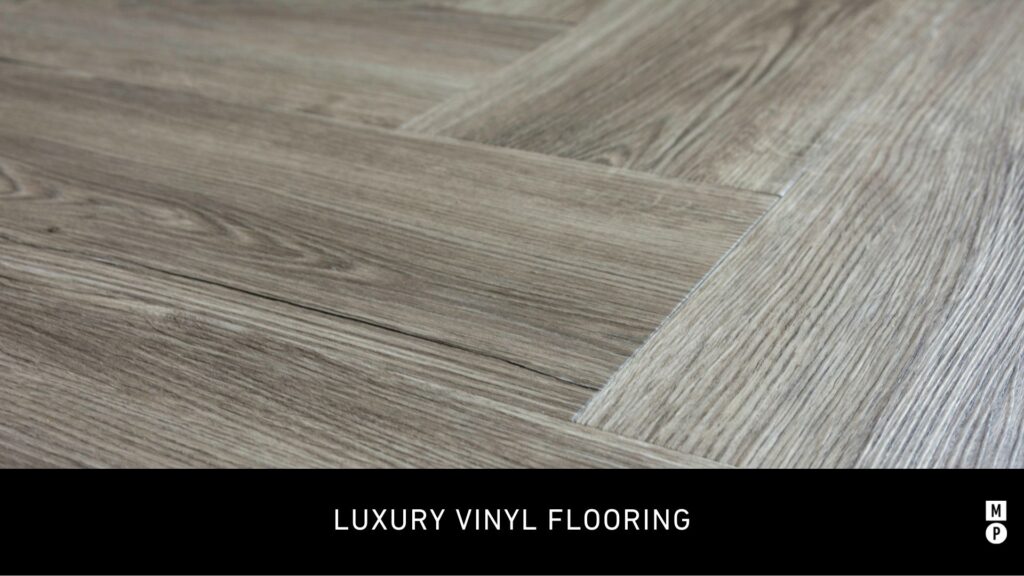
Among the most affordable and high-quality flooring on the market today is luxury vinyl flooring (LVF).
Luxury vinyl plank (LVP) and luxury vinyl tile (LVT) are two popular types of LVF.
They are made to look like stone or wood but are much more durable and easier to maintain than their natural counterparts.
LVP and LVT are also water-resistant, making them ideal for rental properties located in humid or wet climates.
Another advantage of luxury vinyl flooring is that it is easy to install and can be done so by the average do-it-yourselfer.
If you are looking for an attractive, durable, and affordable flooring option for your rental property, luxury vinyl flooring is the way to go.
Features
- Can be more affordable than wood floors and even carpeting
- Extremely easy to install, not requiring a complicated or labor-intensive installation
- Come in a large assortment of colors, patterns, and textures, designed to suit any style
- Very durable over the long term
- Easy to maintain, only requiring sweeping or mopping every once in a while
Cons
- Once the flooring is installed, it can be difficult to remove
- Lower quality options aren’t as durable as thicker, quality options
Pricing
On average, luxury vinyl planks cost between $2.5 and $12 per square foot and luxury vinyl tiles average about $1 and $10 per square foot.
2. Carpet
Best for bedrooms
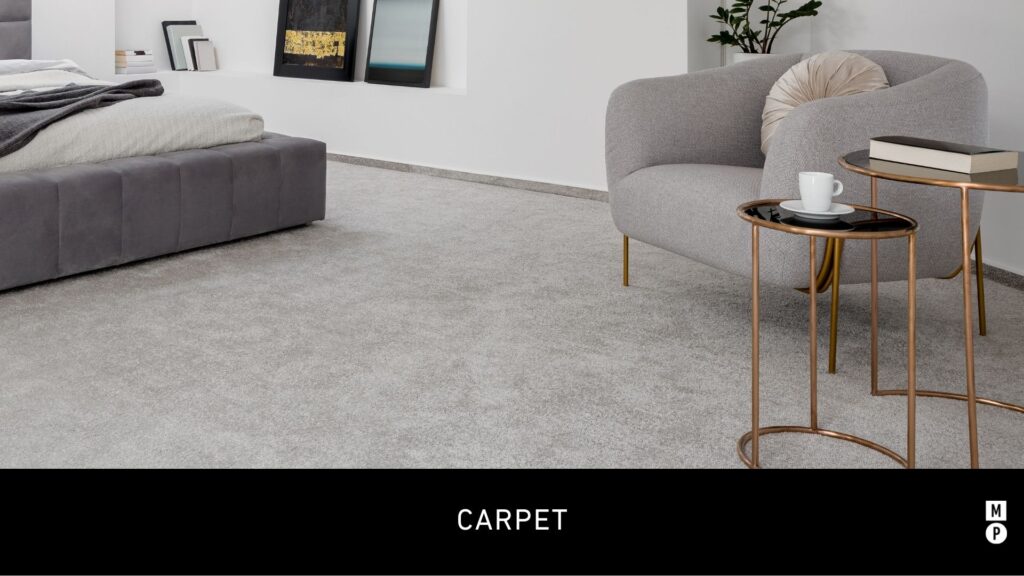
If you are looking for a cozy and comfortable flooring option for the bedrooms in your rental property, look no further than carpet.
Carpet is soft and welcoming, making it ideal for a space where people will be spending a lot of time relaxing.
It is also relatively inexpensive and easy to install.
However, carpet does have some drawbacks.
It is not as durable as other flooring options and can be difficult to clean, making it less than ideal for high-traffic areas.
Carpet is best suited for bedrooms and other low-traffic areas of your rental property.
Features
- Adds warmth and comfort to a room
- Provides added insulation for heat
- Dampens sound and be quieter than hard surface flooring
- Relatively inexpensive compared to other options
Cons
- Can trap allergens and other pollutant matter, reducing indoor air quality
- Can easily get stained or damaged, requiring a deep cleaning with special equipment
- Can retain odors and moistures leading to the growth of mold or mildew
Pricing
On average, carpet costs between $1 and $4 per square foot.
3. Laminate
Best for a budget hardwood appearance
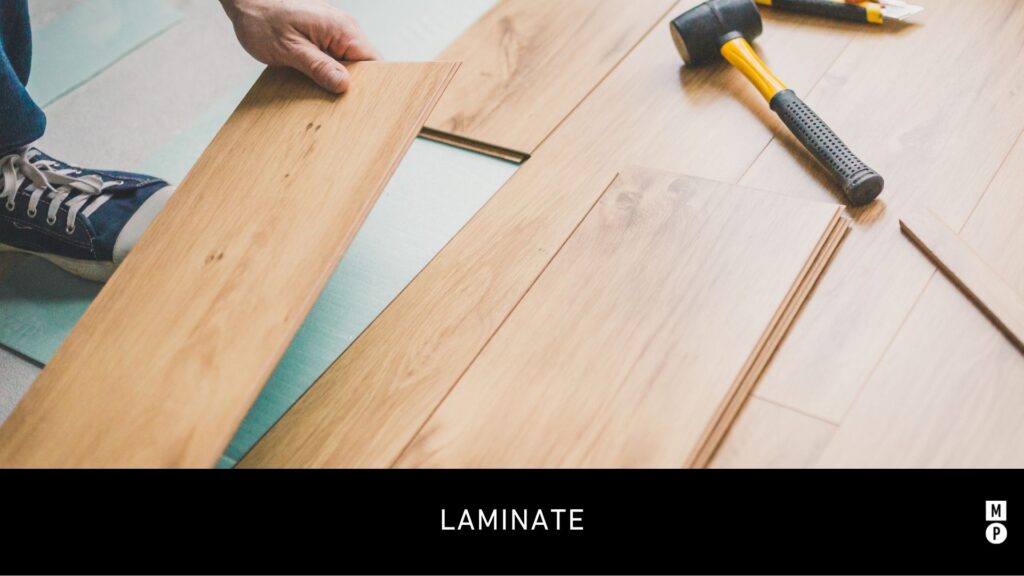
Laminate is a synthetic flooring option that is designed to look like wood but is more durable and easier to maintain.
It is a popular choice for rental properties because it is relatively inexpensive and easy to install.
Laminate is also scratch and stain-resistant, making it ideal for high-traffic areas.
However, laminate is not as durable as other flooring options and can be damaged by water. It is best suited for rooms that are not prone to moisture.
Features
- Extremely durable and able to withstand high traffic, scratches, and discoloration
- Can be an eco-friendly option since some laminate flooring is made from recycled materials
- Easy to install and can be a do-it-yourself project to save on installation expenses
- Easy to maintain by simply cleaning with a broom or damp mop every once in a while
Cons
- Can be sensitive to too much moisture
- Has a more artificial appearance than other floorings alternatives
Pricing
On average, laminate flooring costs between $4 and $11 per square foot.
4. Engineered Hardwood
Best for a hardwood appearance
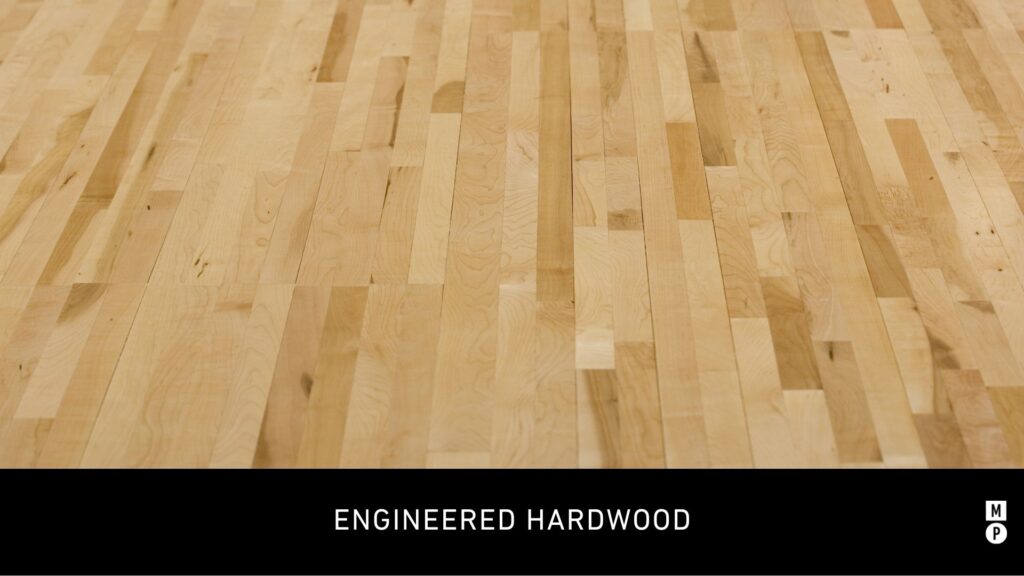
Engineered hardwood is a type of flooring that is made from real wood but is designed to be more durable and easier to install than traditional hardwood.
It is a popular choice for rental properties because it has the classic look of hardwood but can be more resistant to scratches and dents.
An advantage of engineered hardwood is that it can be easier, quicker, and cheaper to install than traditional hardwood while still providing the same classic hardwood look.
However, engineered hardwood does not offer the same added value to a property as traditional hardwood and cannot be resurfaced as easily.
Features
- Labor and materials cost less than solid hardwood
- Easier to install with a click-and-lock system or by nailing it down
- Made from real wood, so it has the classic hardwood look that renters may be looking for. Available in a wide variety of wood species, colors, and finishes.
- Less sensitive to changes in temperature and moisture than solid wood flooring
- Can save you money if you want the look of exotic woods, like mahogany or teak, without the price tag
Cons
- Unlike solid hardwood flooring, engineered hardwood has a more limited resurfacing and refinishing life
- Not waterproof, so spills and pet accidents must be cleaned up quickly to prevent damage
Pricing
On average, low-end engineered hardwood costs between $3 to $5 per square foot, midrange averages about $5 to $10 per square foot, and high-end costs between $8 to $13 per square foot.
5. Solid Hardwood
Best for long-term property value
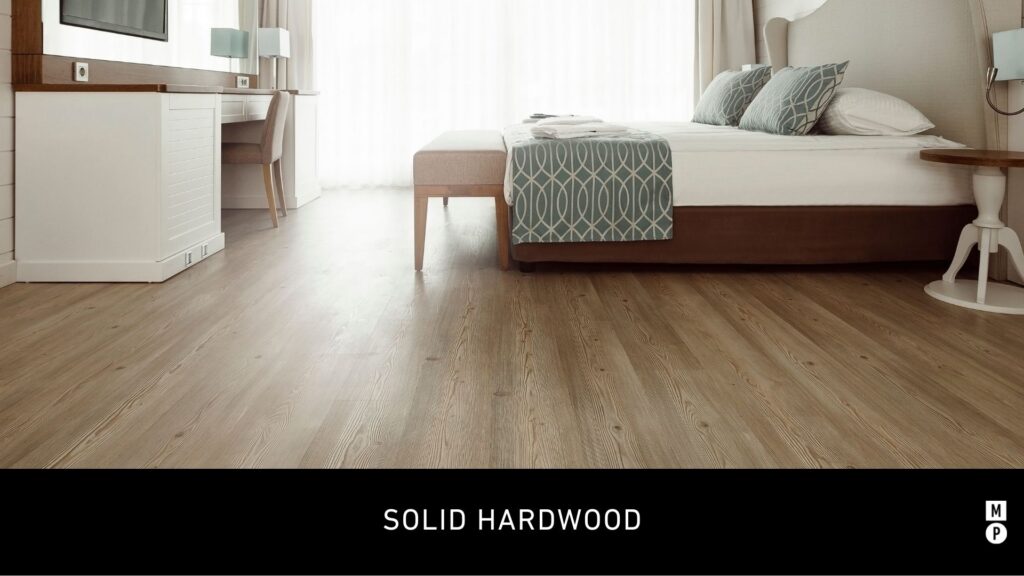
Solid hardwood is the classic choice for floors and is made from 100% real wood.
There’s a wide variety of wood species, colors, and finishes to choose from to fit the style of your rental property.
Hardwood floors can last for decades with proper care and is a popular choice for rental properties because it adds value to the property. Although the pricing might be a bit higher than some of the other options, it is worth the investment for rental property owners who are looking for a flooring option that will last.
It is important to note that solid hardwood is not as resistant to scratches and water damage as some of the other options on this list. This can be an issue with rental properties, as there is often more foot traffic and a higher risk of spills and damage.
Features
- Adds classic beauty and value to your property
- Multiple wood species, colors, and finishes to choose from and can be stained when you want to change the property’s aesthetic
- Lasts for decades with proper care
- Can be sanded and refinished multiple times to change the color or finish
Cons
- More expensive than other types of flooring
- Installation can be time-consuming and difficult
- Can be easily scratched and dented
Pricing
On average, solid hardwood flooring costs between $5 and $25 per square foot.
6. Linoleum
Best for a budget long-lasting flooring
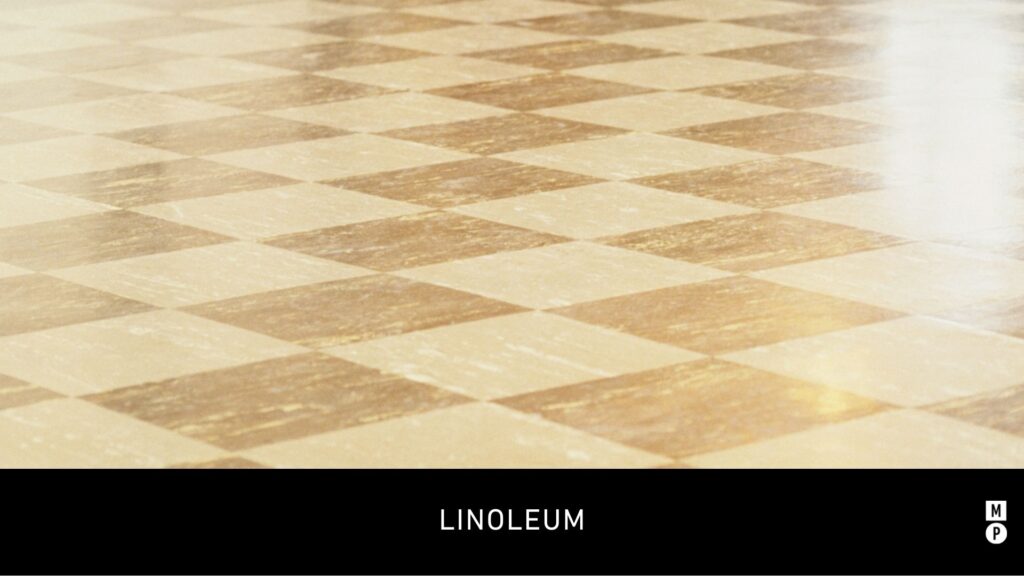
Linoleum is a type of flooring that is made from natural materials, like cork dust, wood flour, and linseed oil. It can be a popular choice for rental properties because it is an inexpensive and durable option.
With proper care, linoleum floors can last for decades. They are also easy to clean and maintain, which is important for rental properties.
However, one downside of linoleum is that it can be easily damaged by water and is not as scratch-resistant as some of the other options on this list.
Features
- Incredibly durable and can last up to 40 years if properly maintained
- An eco-friendly option that is biodegradable, non-toxic, and will decompose when disposed of, unlike vinyl alternatives
- Since a dye is infused through the flooring, not simply a decal layer, patterns and colors will not fade easily
- A softer material that feels more comfortable to stand on for extended periods
Cons
- Easily damaged by water or other liquids
- Releases an odor when first installed
- Can be scratched more easily than some of the other options
Pricing
On average, sheet linoleum costs between $2 to $2.50 per square foot and linoleum tiles average about $3.50 to $5 per square foot installed.
7. Tile
Best for wet and hot climates
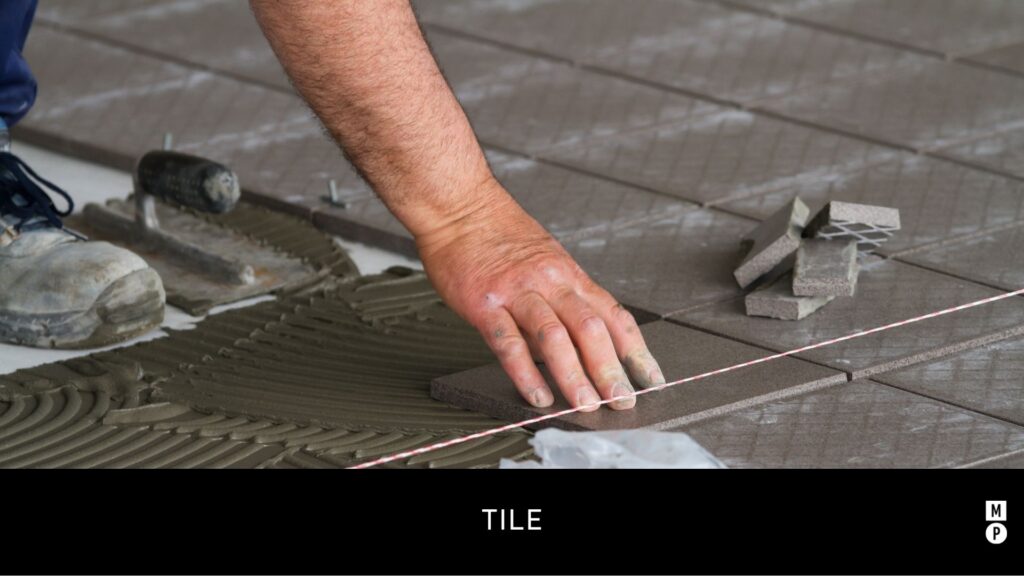
Tile is a type of flooring that is made from ceramic, porcelain, or stone. It is a popular choice for rental properties because it is durable and easy to maintain.
Tile floors are resistant to water, scratches, and stains, making them ideal for homes in wet or hot climates. They are also a good choice for rental properties that allow pets, as they are easy to clean and do not show pet hair as much as some of the other options on this list.
One downside of tile is that it can be cold to the touch and is not as comfortable to stand on for extended periods of time. It is also a more difficult type of flooring to install, so it is important to hire a professional if you choose this option.
Features
- Extremely water-resistant, making it ideal for homes in wet or hot climates
- Resistant to scratches, stains, and pets
- Easy to clean and maintain by simply mopping, sweeping, or wiping
- Does not show pet hair as much as some of the other options
- Can have a luxury look and feel in certain applications
Cons
- Can feel cold and uncomfortable to stand on. It can also be quite slippery when wet.
- Difficult to install and best left to professionals
- Can crack or chip if something heavy is dropped on it
Pricing
On average, tile costs between $7 to $24 per square foot.
How to choose the best flooring for a rental property?
Now that you know the best flooring options for a rental property, it’s time to choose the best one for your property. To do this, you need to consider the climate of your rental property, the type of tenants you have, and your budget.
In most instances, luxury vinyl flooring will be the best option for a rental property. It is an affordable, attractive, and durable option that is easy to install and maintain. This has become one of the most popular flooring choices in recent years for both homeowners and rental property owners.
However, if you have a rental property in a wet or hot climate, tile is a great option because it is water-resistant and easy to maintain. If you have tenants with pets, tile is also a good choice because it is easy to clean and does not show pet hair as much as some of the other options.
If you are looking for an affordable option that is also long-lasting, linoleum is a good choice. It is made from natural materials and can last for decades with proper care. However, it is not as scratch-resistant as some of the other options on this list.
Finally, if you are looking for a luxury option that will impress your tenants, hardwood is a great choice. It is an elegant flooring option that is sure to impress your tenants. However, it is also one of the most expensive options on this list.
No matter what flooring option you choose, make sure to hire a professional to install it. This will ensure that your floors are installed properly and will last for many years.
Should flooring be the same throughout the house?
While you can choose to have the same flooring throughout your rental property, it is not required. In fact, in some instances, it may be best to have different types of flooring in different areas.
For example, if you have a rental property with a kitchen and bathroom, you may want to consider having tile in the bathroom and luxury vinyl or linoleum in the kitchen. This is because tile is more water-resistant than the other options, making it ideal for areas that are prone to spills.
In the living areas and bedrooms, you have more flexibility when it comes to flooring choices. In these areas, you may want to consider hardwood, luxury vinyl, or carpet.
However, for rental property owners on a budget and limited timeline, it is best to stick with one type of flooring throughout the house. This will make installation and maintenance much easier.
Summary
There are many different flooring options to choose from when selecting the best flooring for a rental property. The best option for you will depend on the climate of your rental property, the type of tenants you have, and your budget. In most cases, luxury vinyl, carpet, or a mix of both is a great choice for a rental property. However, if you have a rental property that already has hardwood floors, you may want to consider keeping them. Hardwood floors are an elegant flooring option that is sure to impress your tenants.
Whichever flooring option you choose, make sure you are keeping the aesthetic of your rental property in mind. You want to choose a flooring option that will complement the overall look of your property. You also want a long-lasting option that is easy to install and maintain. With so many different flooring options available, you are sure to find the best one for your rental property.

Pingback: 5 Best Carpets For A Rental Property (2022 Guide)